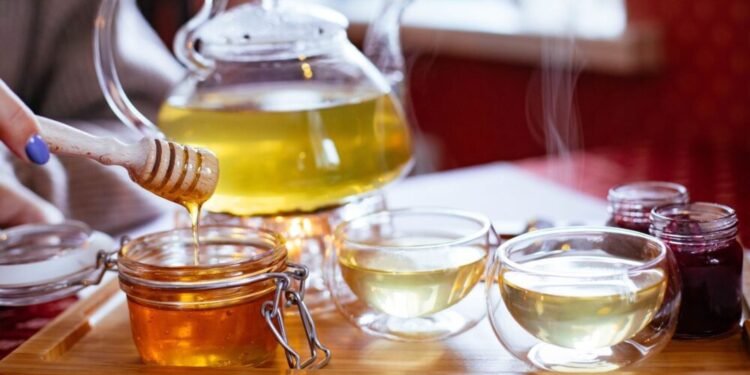Moroccan honey, a revered delicacy in its native land, is prized for its distinctive flavors and enriching nutritional content. This article delves into the intricate details of Moroccan honey, from the diverse range of flavors to the deep-rooted cultural significance. The journey takes us from the raw slopes of the Atlas Mountains to the energetic flea markets of Marrakech, unraveling the peculiar characteristics that make Moroccan honey an enchanting experience for the culinary world.
History of Moroccan Honey
Ancient Origins
Peeling back the layers of history, we uncover the roots of Moroccan honey dating back to eons ago when beekeeping was already flourishing in this region. Thanks to Morocco’s distinctive climate and opulent floral diversity, bees have thrived here for generations. As a result, the cherished honey bears a distinct floral and grassy aroma, reflecting the country’s botanic richness.
The superior flavor profiles and quality have held Moroccan honey in high esteem over time, securing its place in the pantheon of honey varieties. The traditional beekeeping methods, still followed today, encapsulate this link to history, offering an undiluted experience for the consumer.
Traditional Beekeeping Methods
Beekeeping practices in Morocco handed down through generations, safeguard the legacy of superior quality honey. Notably, beekeepers use skeps, spherical structures composed of straw or wicker, as habitats for honeybees. These structures reciprocate the natural ecosystem of the bees, enabling them to comfortably build their combs and produce honey.
To keep anxiety at bay during hive inspections, beekeepers utilize smoke puffing, a time-tested method that minimizes disruption to the bees and preserves the honey’s innate floral aroma and robust saffron-tinged taste.
Significance in Moroccan Culture
Honey is a critical component of Moroccan culture, integral in various facets of everyday life. Moroccans have esteemed honey as a symbol of warm hospitality and generosity for centuries and it is typically given as a traditional offering to guests. It is also a key player in Moroccan gastronomy, tipping dishes like pastries, tagines, and teas with a unique flavor. Beyond its use in cuisine, honey is a renowned panacea.
The myriad health benefits have been hailed in Moroccan folklore, from enhanced digestion and immune support to relief for various health woes. Honey is deeply ingrained in the culture of Morocco, appearing in customary rituals, gastronomical practices, and therapeutic applications.
Types of Moroccan Honey
Orange Blossom Honey
Orange Blossom Honey, a sub-variety of Moroccan honey, is celebrated for its exquisite flavor and aromatic profile. This honey comes with soft floral nuances and whispers of sweetness, making it a preferred choice for tea brewing and confectioneries. The honey is derived from the nectar of orange blossoms, lending it a subtle citrusy hint. Its versatile flavor profile enables it to accentuate a diverse range of dishes without overwhelming the palate.
The exotic taste of Orange Blossom Honey sets it apart from other honey varieties and makes it a staple in Moroccan kitchens.
Thyme Honey
Another standout variety is Thyme Honey, known for its distinctive taste profile and potential health benefits. This variant is defined by a pronounced floral fragrance and deep, sweet taste. Traditionally, Thyme honey has been a go-to remedy for respiratory issues, attributed to its antimicrobial properties. Moreover, the heightened antioxidant content lends it the power to bolster the immune system and overall health.
So, thyme honey can offer not just a palatable sweetness but also lend a wholesome touch to your regular diet.
Wildflower Honey
Wildflower honey earns itself the place of favor among honey enthusiasts with its delightful fragrance and flexible use. Its distinctive grassy aroma lends an interesting twist to various dishes and beverages. This honey pairs well with cheeses, yogurt, and teas, providing a palate-pleasing twist. A complimentary wooden hone dipper accompanies the 16 oz (1 lb) jar, making honey consumption all the more convenient.
Keep in mind that infants and anyone under the guidance of a healthcare professional should consult them before consuming this product.
Health Benefits of Moroccan Honey
Antioxidant Properties
One of the many celebrated attributes of Moroccan honey is its antioxidant capabilities, instrumental in combating free radicals within the body. Antioxidants shield the cells from oxidative stress and potential damage. Notably, Moroccan honey possesses high polyphenol content that accounts for its antioxidant potency. The presence of elements such as flavonoids and phenolic acids further amplifies its antioxidant activity.
This makes Moroccan honey a valued addition to your diet, supporting your overall health and wellness.
Antibacterial and Antifungal Properties
Another feather in the cap for Moroccan honey is its strong antibacterial and antifungal properties. The honey contains beneficial enzymes that combat dangerous bacteria and fungi, thus promoting a robust immune system. Moroccan honey can be applied to wounds and burns to expedite healing and prevent infections. It can also assist in maintaining good gut health and in remedying common bacterial and fungal infections.
Digestive Health Benefits
A well-balanced digestive system is key to your overall health, and Moroccan honey can play a crucial role in achieving that.
- Digestive aid: Moroccan honey’s natural enzymes facilitate food breakdown and promote digestion while alleviating discomfort, such as bloating and indigestion.
- Soothes the digestive tract: The anti-inflammatory characteristics of Moroccan honey can ease the symptoms of gastrointestinal disorders.
- Promotes gut health: Moroccan honey acts as a prebiotic, nourishing the beneficial gut bacteria and thereby supporting optimal digestion.
Uses of Moroccan Honey
Culinary Applications
Moroccan honey acts as a culinary chameleon, seamlessly adapting to a variety of dishes. Its complex flavors enrich marinades, dressings, and sauces. Its floral scent and grassy notes pair well with both sweet and savory delicacies, bringing them to life. Enjoy it as a glaze over roasted vegetables or a topping over desserts such as yogurt or ice cream. The bold flavor of Moroccan honey embraces different cuisines, adding a spark to any chef’s creation.
Skincare and Beauty
Beyond the kitchen, Moroccan honey plays a valuable role in the beauty and skincare armamentarium. Being rich in antioxidants, it defends the skin against environmental stressors, paving the way for youthful and radiant skin. Moroccan honey also boasts enzymatic properties, gently exfoliating and unclogging skin pores. Its moisturizing nature detoxifies and hydrates the skin.
Traditional Medicinal Uses
Moroccan honey has a rich history in traditional healing practices for its remarkable wellness benefits. For instance, its antimicrobial properties are known to effectively treat infections and wounds. It is also known to provide relief from coughs and sore throats due to its inherent anti-inflammatory virtues. Moreover, it is hailed for its antioxidants which may help safeguard against certain diseases.
Additionally, it has been noted to alleviate digestive problems and nurture gut health.
Entering the Moroccan Honey Market
Finding Authentic Suppliers
When seeking authentic Moroccan honey suppliers, conducting thorough research is pivotal. Choose suppliers who source their honey directly from Moroccan apiarists and have a transparent supply chain. Verify their compliance with industry standards and accreditations such as organic or fair trade certifications. In addition, consider feedback and reviews from past customers to determine the quality and authenticity.
Quality Control and Certification
Ensuring quality control and certification in the Moroccan honey industry is an assurance that the consumers receive a product that meets high standards. This is realized through thorough testing and inspection procedures including lab analysis and sensory evaluations. Trustworthy certification bodies regularly monitor to maintain the authenticity and quality of Moroccan honey.
Marketing and Distribution Channels
Harnessing strategic marketing and distribution channels is key to successful growth in the Moroccan honey industry.
For example, using e-commerce platforms can help producers sell directly to international consumers. Social media platforms can serve as a reliable marketing tool, allowing producers to connect with consumers and showcase the unique properties of Moroccan honey.
Additionally, collaborating with local specialty stores provides an opportunity to reach niche markets and customers who value high-quality, natural products.




























